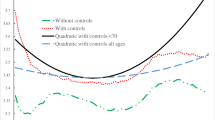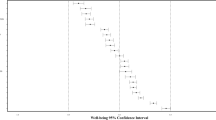Abstract
This paper investigates the determinants and consequences of subjective well-being. Although there is an extensive literature on well-being there are few panel studies which measure well-being frequently and over a long time period. The Australian Youth in Transition panel data is used to examine several aspects of well-being: the influence of sociodemographic and labour market characteristics, the dynamics of well-being and its determinants; the isolation of aging, cohort and contextual effects, and the effects of well-being on marital status and labour market outcomes. Women and those married or in de facto relationships show higher levels of well-being. The effect of being in a de facto relationship is sensitive to age. The presence of children decreases subjective-well-being and again this effect is age-specific. Income and occupational statusalso influence well-being with income having consistent effects and status effects declining. The unemployed consistently show substantially lower levels of well-being. Contextual effects were identified, increases in the national level of unemployment decrease average well-being levels in all but the youngest cohort. Controlling for lagged effects, subjective well- being has substantial effects on the odds of being married and unemployed, smaller effects on income and age specific effects on being in a de facto relationship.
Similar content being viewed by others
REFERENCES
Aldrich, J. H. and F. D. Nelson: 1984, Linear Probability, Logit and ProbitModels (Sage, Thousand Oaks, California).
Broom, L. and F. L. Jones: 1976, Opportunity and Attainment in Australia (Canberra, Australian National University Press).
Chilman, C. S.: 1982, 'Major trends of families and their mental health in the United States: 1957–1978', International Journal of Sociology of the Family 12, pp. 217–227.
Costa, P. T., R. R. McCrae and A. B. Zonderman: 1987, 'Environmental and dispositional influences on well-being: Longitudinal follow-up of an American National sample', British Journal of Psychology 78, pp. 299–306.
Diener, E.: 1984, 'Subjective well-being', Psychological Bulletin 95, pp. 542–575.
Diener, E., E. Sandvik, L. Seidlitz and M. Diener: 1993, 'The relationship between income and subjective well-being', Social Indicators Research28, pp. 195–223.
Finkel, S. E.: 1995, Causal Analysis With Panel Data (Sage, Thousand Oaks, California).
Haring, M. J.,W. A. Stock and M. A. Okun: 1984, 'A research synthesis of gender and social class as correlates of subjective well-being', Human Relations 37, pp. 645–657.
Headey, B.: 1988, 'The life satisfactions and priorites of Australians', in J. Kelley and C. Bean (eds.), Australian Attitudes: Social and Political Analyses from the National Social Science Survey (Allen & Unwin, Sydney), pp. 163–175.
Headey, B. and A. Wearing: 1992, Understanding Happiness. A theory of wellbeing (Longham Cheshire, Melbourne).
Inglehart, R.: 1990, Culture Shift in Advanced Industrial Society (Princeton University Press, Princeton).
Jones, F. L.: 1989, 'Occupational prestige in Australia. A new scale', Australian and New Zealand Journal of Sociology 25, pp. 187–199.
Lahelma, E.: 1992, 'Unemployment and mental well-being: Elaboration of the relationship', International Journal of Health Services, 22, pp. 261–274.
Littell, R. C., G. A. Milliken, W. W. Stroup and R. D. Wolfinger: 1996, SAS System for MixedModels (SAS Institute, Cary, NC.).
Mastekaasa, A.: 1994, 'Marital status, distress, and well-being: An international comparison', Journal of Comparative Family Studies 25, pp. 183–205.
Myers, D. G. and E. Diener: 1995, 'Who is happy', Psychological Science 6, pp. 10–19.
Veenhoven, R.: 1994, 'Is happiness a trait? Tests of the theory that a better society does not make people happier', Social Indicators Research 32, pp. 101–160.
Veenhoven, R.: 1996, 'Developments in satisfaction-research', Social Indicators Research 37, pp. 1–46.
Winefield, A. H., H. R. Winefield, M. Tiggeman and R. D. Goldney: 1991, 'A longitudinal study of the psychological effects of unemployment and unsatisfactory employment on young adults,' Journal of Applied Psychology 76, pp. 424–431.
Wood, W., N. Rhodes and M. Whelan: 1989, 'Sex differences in positive wellbeing: A consideration of emotional style and marital status', Psychological Bulletin 106, pp. 249–264.
Author information
Authors and Affiliations
Rights and permissions
About this article
Cite this article
Marks, G.N., Fleming, N. Influences and Consequences of Well-being Among Australian Young People: 1980–1995. Social Indicators Research 46, 301–323 (1999). https://doi.org/10.1023/A:1006928507272
Issue Date:
DOI: https://doi.org/10.1023/A:1006928507272




